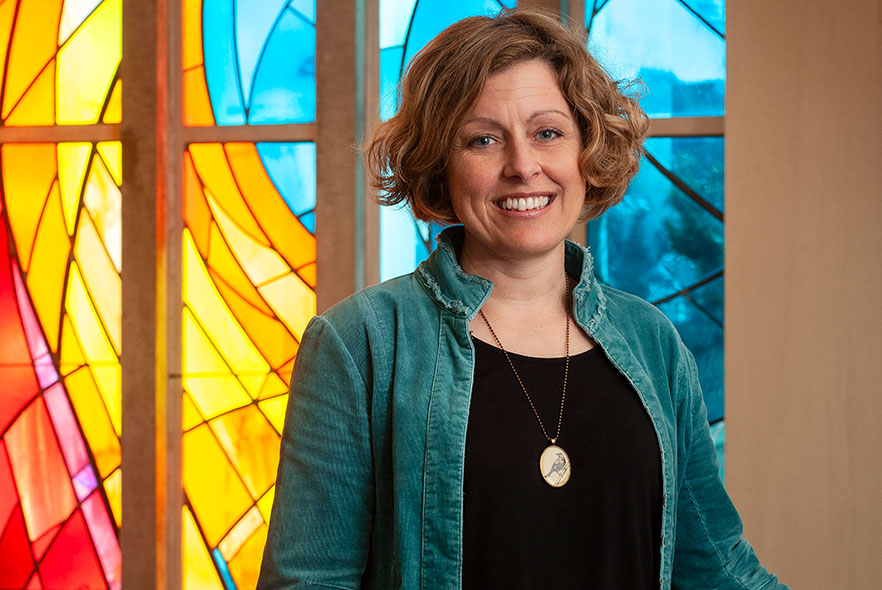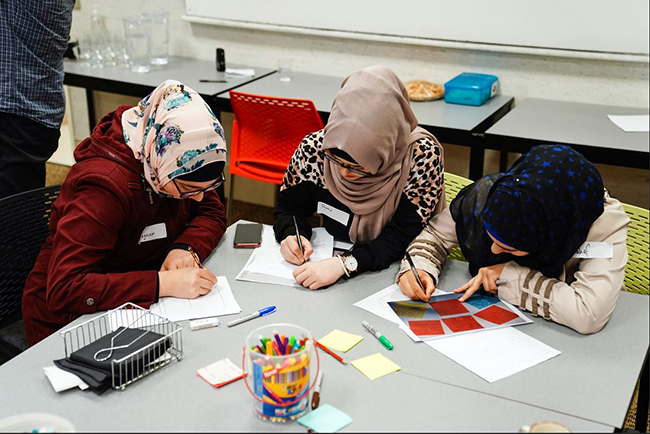Thursday 16 December 2021 3:53pm

A love for the “deep and rich” discipline of Education and a belief in the power of great teaching to change lives drives recently appointed College of Education Dean Associate Professor Vivienne Anderson.
Vivienne’s career in education began with primary school teaching in Christchurch and Palmerston North. After moving to Dunedin in 2002 and experiencing education differently as a parent of young children, she decided to embark on part-time postgraduate study. This led on to doctoral study, and her PhD in Education and Anthropology was conferred in 2008.
Academic roles at Otago followed – first as a research fellow doing educational research in the Dental School and then as a lecturer and senior lecturer at the College of Education.
A five-year stint supporting teaching and learning across the University through the Higher Education Development Centre afforded many insights into the complexities of teaching and learning across University departments.
Vivienne describes teaching and researching educational questions across a range of contexts at Otago as a privilege and instructive.
“During my time in the dental school, for instance, I developed a deep respect for clinical teachers, who support and mentor novice clinicians while ensuring patient safety. I also learnt the value of Education as a disciplinary ‘lens’ through which to think about teaching and learning in other disciplines.”
“In some respects, the principles of good teaching are astoundingly transferable. Whether you’re working with five-year-olds or 55-year-olds, an open and friendly disposition, a passion for helping others learn, an ability to communicate clearly and to adapt communication, excellent observational and listening skills, and an ongoing commitment to keep learning, all go a very long way towards effective teaching.”
Vivienne returned to the College of Education as Associate Dean in November 2020 and says the position as Dean appealed because education is “critically important to the future of our community and country, and the future of the University of Otago.”
“The College of Education is staffed by a wonderful community of experienced educators and education scholars with a deep commitment to social justice, teaching and learning. It also serves a much wider community of mana whenua and tangata whenua partners, education sector colleagues, and community stakeholders.”
Future priorities
A priority as Dean will be strengthening relationships with mana whenua and local rūnaka, iwi Māori and Pasifika communities, and working towards a College that “more fully reflects the diverse communities it serves, contributing to more equitable educational and social futures”.
Part of this process will be building the College’s capability and profile as a site of excellence in educational research that is responsive to its partnership relationships and informs the work of education and community sector colleagues and policymakers.
“The College of Education has a proud history of producing excellent teachers and is well-known for this. However, historically, education more broadly has also been implicated in colonising relationships in Aotearoa, Te Waipounamu, and the Oceania region. There is an urgent and ongoing need to realise the power of education for making lives better at an individual, family and community level, and our responsibilities in this regard.”
What sort of graduates do we need?
Vivienne says that the College of Education is committed to producing graduates with a critical awareness of the role that education and educators play in changing lives for the better.
“Our graduates inhabit a number of education and policy spheres, and we hope they make a positive difference in whatever they do. In the case of our Initial Teacher Education students, we hope that they also leave us with a robust understanding of Te Whāriki or the New Zealand Curriculum, and how people learn; the confidence, knowledge and skills necessary to engage children and young people effectively in learning; a willingness to partner with whānau and communities to support children and young people’s learning; the self-awareness, cultural competence, and professional humility to work safely with others; and a commitment to ongoing learning!”
The importance of research
As a New Zealand registered teacher and researcher, Vivienne sees research as critically important for informing effective and reflective practice in educational settings.
Vivienne has researched questions relating to education pathways; gender, equity and education; migration and education; internationalisation; and education policy and leads a three-year research project called the Secondary to Tertiary Transitions Project. This project involves working with refugee-background young people in Dunedin and Invercargill as they explore education pathways and navigate the transition from secondary to tertiary education.
To date, 37 young people have participated, and they are also collaborating with the research team to produce resources that can inform practice across education sectors in New Zealand. The research outcomes will also inform policy and practice at the intersection of refugee resettlement and education.
“While the College of Education is perhaps best known for its initial teacher education programmes, Education is a rich discipline that offers wonderful conceptual and theoretical tools for understanding human social life and how people learn across a range of ages and contexts. Education scholarship reveals the importance of good teachers and can powerfully inform their work, but Education has much to offer beyond teacher education per se. I look forward to championing Education and the work of educators within the University and beyond.”
Vivienne currently serves on the University of Otago’s Equity Advisory Committee and Otago Tertiary Chaplaincy Trust Board (as a University of Otago representative). She is Associate Director of the Centre for Global Migrations, a University of Otago research theme.
(Below: Dunedin-based pupils who are participants on the Secondary to Tertiary Transitions Project).

